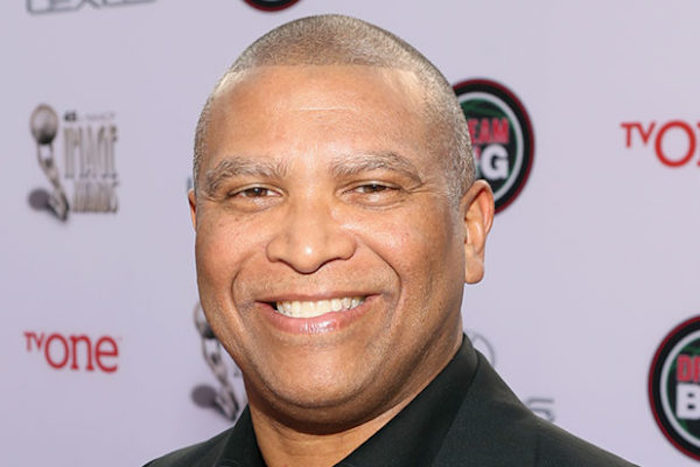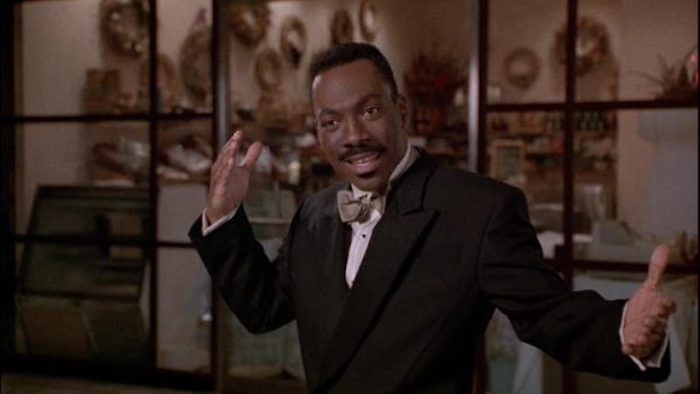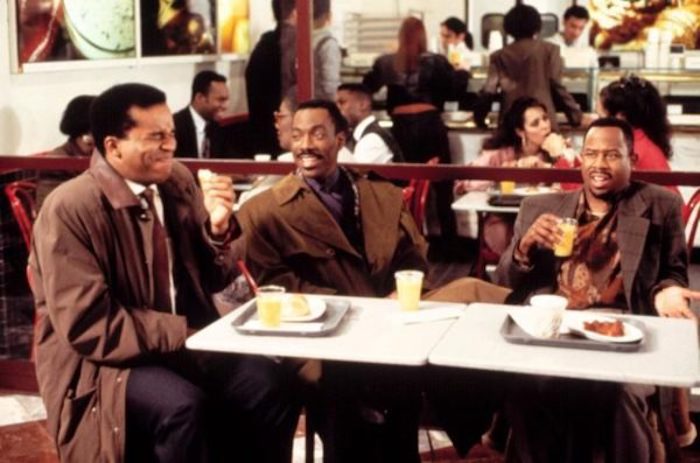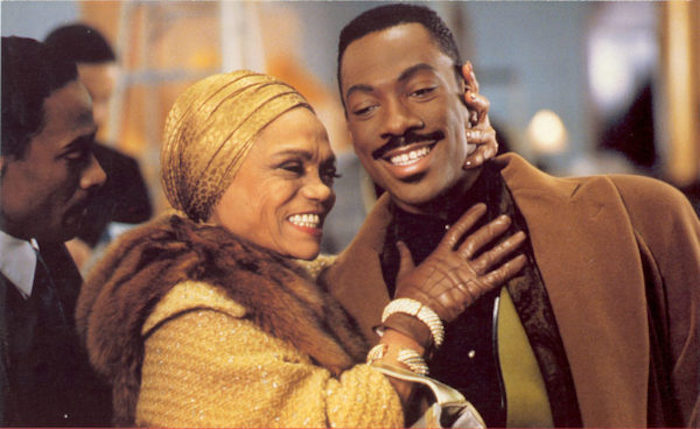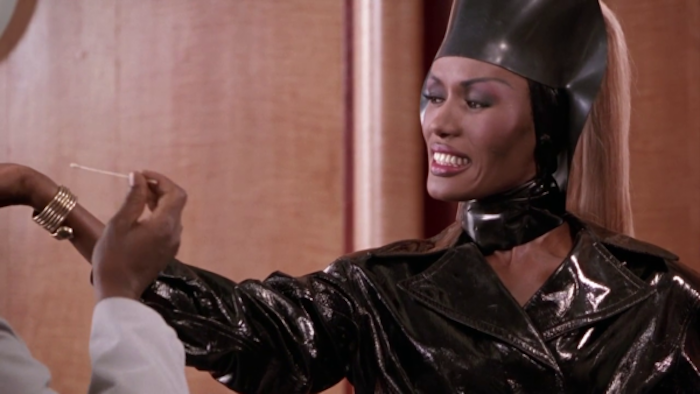‘BOOMERANG’ DIRECTOR REGINALD HUDLIN TALKS FILM’S IMPACT, EDDIE MURPHY’S TURNING POINT AND THE FUNNY ‘SERIOUSNESS’ OF GRACE JONES’ STRANGÉ
*From throwing an epic “House Party” with Kid-n-Play and the late Robin Harris to gearing up to shine a light on the life of Supreme Court Justice Thurgood Marshall and one of his first cases, Reginald Hudlin has a knack for being at the right place at the right time.
Need proof?
Check out his second big screen endeavor, a little film you might know that came out in the ‘90s. They call it “Boomerang.”
With a cast of present and future household names, a hits-filled soundtrack and a story showcasing that rare thing in cinema called black love, Hudlin was the man who put the pieces together to direct a certified classic.
This year (2017) marks the 25th anniversary of “Boomerang,” which arrived in theaters on July 1, 1992 and starred Eddie Murphy as Marcus Graham, a successful, womanizing ad executive who meets his match in his boss Jacqueline Broyer, played by Robin Givens.
The romantic comedy – which featured Halle Berry, Martin Lawrence, Tisha Campbell-Martin, David Alan Grier, Grace Jones, John Witherspoon, Eartha Kitt and Chris Rock – was an alternative to dramatic works set in the rough streets of the hood. “Boomerang” proved a worthy follow up to Hudlin’s other classic film, 1990’s “House Party, ” raking in $13,640,706 on its opening weekend to secure a number three ranking at the box office that carried over in to its next two weekends. In all, more than $70 million was made domestically by the time “Boomerang” left the theater, in addition to $61 million overseas.
In less financial terms, Hudlin admits being “completely nervous” when feeling Murphy’s star power the first day he filmed “Boomerang.”
“I remember the first day being completely nervous. Eddie Murphy was late to set and then they finally said, ‘He’s here.’ I had to walk across this big field, open field, with a gift to him and I was so nervous, I felt my leg was heating up,” the filmmaker told EURweb.com while detailing how he and Murphy were on the same wavelength with getting “Boomerang” made years after meeting each other when “House Party” was released.
“We had met and talked about how we wanted to make movies together and spent a year throwing different ideas back and forth… he [Murphy] sent me this script and I thought, ‘Wow, this is the kind of movie you should be making next.’ It’s certainly the kind of movie I wanted to make next.
“But this is day one of actually making the movie and stakes were high and I had to be cool. And you just can’t never let them see you sweat,” Hudlin continued. “I just remember being very stressed, but I had to be on my job. So I just went over there and got to work.”
Although things were all business onset, there was too much fun in the air for everyone to remain in a serious state of mind. No matter what, Hudlin was confident he had a winner on his hands with “Boomerang.”
“Everyday we laughed. Everyday we had a great time, so we knew we had something special. The chemistry that the entire cast had together was amazing. The sets, the wardrobe. Everything was just clicking. We always believed in the movie. I remember one point, somebody was questioning some of the casting. I said, ‘One day people are gonna look back and they won’t believe all these people were in the same movie,’” Hudlin stated about his all-star roster. “And that’s kind of what has happened. We’re at the point where people are like, ‘Wow, this is everybody we love all in the same movie and everyone got a chance to shine.’”
With the talent on hand, it wasn’t hard to see why the “Boomerang” cast brought their A-game to the table. In Hudlin’s eyes, the objective was to surround Murphy with those who could bring out the best in him.
“I really wanted to surround Eddie with the best possible people,” the director said. “I so often found that Eddie makes these great movies. It’s not that he didn’t have talented people with him, but I just thought, ‘God, what if we really, really ratched it up so that everyone in the movie is incredible. They may not be as famous as him, but they could just be incredible talent, particularly incredible black talent.”
Years later, “Boomerang” and it’s quotable scenes and lines are still remembered and acted out by fans, who never get tired of seeing a player getting a taste of his own medicine in the funniest ways possible.
“I’m just really grateful that the movie continues to be popular and I feel very fortunate that Eddie chose me for the job,” Hudlin stated. “I feel like we did something that we’re all really proud of. We got compliments from everybody from Lena Horne to Ice Cube and that’s about a wide a range as you can get. And they all love the movie. So I’m grateful that 25 years later, that people are still fans.”
As the chat continued, Hudlin took EURweb on a trip down memory lane to speak on acquiring Eartha Kitt for “Boomerang,” Murphy’s professional “turning point” with the ‘90’s romantic comedy and how Halle Berry could not resist the “seriousness” of Grace Jones’ Strangé.
EUR: How was it working with this level of talent while directing “Boomerang”? You had the best of the new (Halle Berry, Chris Rock, Tisha Campbell, Martin Lawrence and David Alan Grier) being early in their careers and you had veterans like Eddie Murphy, John Witherspoon, Eartha Kitt and Grace Jones. Was it overwhelming for you?
Reginald Hudlin: … the thing is, yeah. I mean you just have to keep a cool head and just be focused and be prepared. That’s the most important thing. Probably the most intimidating person was Eartha Kitt, just because I just kept thinking she had an affair with Orson Wells. I mean she cussed out the First Lady, you know. She’s a woman of such incredible achievement, such incredible strength …even getting her to do the film, she would say, ‘Well, maybe…’ We really had to talk her in to it. So I was most self-conscious working with her because I just really wanted her to be pleased at all times.
EUR: How much of a challenge was it to bring Eartha Kitt into the fold?
RH: She wanted to make sure that it wasn’t just a part that kind of just made fun of older people. And I understood that and that made sense to me. I didn’t see it that way. I thought she was a character who was in charge. She was in charge of her sexuality and she was the head of the business and she did what she wanted. And she played the player. Eddie thought he was a player, then he played her. And that was fitting with her image throughout her career and that’s how it came off, which was great. What I told her the movie would be is what it was.
EUR: With that and having ‘Boomerang’ set in a space where you have all these successful black people making an impact in the corporate setting, it was a different slice of life than what a lot of us were seeing onscreen. Was that one of the goals you had in mind with this movie, to present this different side of black life?
RH: Yeah, I mean it was a life I was very familiar with. Before my film career started, I worked in advertising in New York. There were several black ad agencies in Chicago, black ad agencies. Whether it was Motown Records, Johnson Publishing and the folks who do Ebony magazine, I knew people that worked at places like that. I had friends who were cool and corporate.
Usually they tried to force black folks to like, ‘Either you’re a successful corporate person and you’re a cornball or you’re a cool guy, but you don’t really have a job. And I was like, ‘Well, that’s just a false choice.’ I thought cool people who were smart executives all the time. I wanted to tell a story that reflected the world that I knew firsthand. And it was shocking to some people. I know a lot of the white critics said, ‘Oh, it’s a science fiction movie’ or ‘Oh, what’s this?’ and I’m like, ‘You need more friends. You certainly need more black friends because if you don’t know this, that’s not on me. That’s on you.’
Particularly with Eddie Murphy, the reputation was kind of a fast-talking con man. And I love those movies too, but I remember the first time we showed Eddie the film, he said, ‘Aw man, I just look really comfortable in my own skin in this movie.’ And he was surprised himself that he really liked his performance in the film, which was wonderful.
EUR: It’s interesting to see him [Murphy] in this movie, knowing the types of films he did before. “Boomerang” is pretty strong on the theme of relationships. Everybody in this film is looking for something to fill that particular void. None of that is more present than seeing Marcus try to come to grips with needing more in his life as far as who he was, who he is and who he wants to be. This new type of role presents a whole ‘nother spin on him [Murphy]. He seems to be, at this present day and time, where Marcus ends up being at the end of “Boomerang.”
RH: Mmhmm
EUR: In your opinion, do you feel “Boomerang” marked a turning point for Eddie Murphy, professionally and personally?
RH: Yeah, I think it did. First of all, I think any actor wants to keep evolving. You don’t want to keep playing the same part over and over again your whole career. If you look at Tom Hanks, he started with ‘Bachelor Party’ and ends up doing all these movies that win Oscars. So I was excited to do a movie that would show another side of Eddie’s talent and show the incredible range that he was capable of.
And you’re right. Every man, you come to a point when you want to make a change. And particularly, if you’re a guy who’s a real ladies man. If you’re a real player, there’s a point where you go, ‘I had a great run, but now I want something more.’
And I remember Eddie, he was a giant superstar. He had an incredible track record as a single man dating, but I remember while we were making the movie, he announced that he was engaged. And we were like, ‘Oh. Ok, good for you.’ And it showed that he was ready to transition in his own life. I think that’s one of the things that contributed to his performance in the film, the fact that he was making that pivot himself.
EUR: Was that a bit of a surprise, working with him and seeing him rise to the level of what he brought to the project?
RH: It wasn’t a surprise to me because if you actually spend time with Eddie, you see the intelligence, the depth of his craft. He’s kind of like an iceberg. All the performances that we’ve seen of him is only the tip. And you realize that 2/3 of his ability is unseen, right. It’s underwater. So my thing as a director is how much of this iceberg can we lift into the public view. How can we show the incredible range of things he can do? So that was the task I kind of set for myself because once you spend time with him, you just go, ‘Wow, this guy can literally do anything.’
EUR: On a personal level, “Boomerang” struck a nerve with people back in ’92 and still holds weight today. At a time when films are released and soon forgotten, why does this film resonate with people after all these years?
RH: Well, I think that kind of coming of age moment of a man, it’s just something that’s a classic theme and everyone is always going to relate to that, men and women, because the characters in the film are relatable, both the male and the female characters…Even when you think about you and your friends, a lot of people go, ‘Wow, I can relate to the Martin character, the David Alan Grier character or the Eddie character because that’s like me and my friends. I’m one of those three guys.’
EUR: Obviously the film centers on Marcus being a player, but the roles are reversed when he meets Jacqueline. With the roles reversed, have you seen that from other people who have seen the film?
RH: I know a lot of women go, ‘I want to be Jacqueline, the Robin Givens character, but I feel like the Halle Berry character,’ [Angela], which is great. Which is one they aspire to be, the other one they feel represents them. That’s a comment I get from a lot of women.
With the guys, they just love it because I think when they see Robin’s character versus Eddie’s character; it feels like a fair fight. Whether you’re a man or a woman, just go like, ‘Ok these two, they deserve each other because they’re tough.’ They each are used to getting over. Eddie’s character is getting what he deserves because he’s a player and now he’s met his match and that’s really satisfying to folks. But ultimately, Eddie’s character wins because he’s able to escape kind of what I call the shopping list. Like, a woman’s got to have this, this, this and this and he just judges people for who they are.
And that’s the real breakthrough, when you stop thinking in kind of simplistic, material terms and just say, ‘Ok, there’s a spiritual connection’ and then everything else is on top of that.
EUR: Another memorable person was Grace Jones as Strangé. How outrageous was she? It was like she owned the role. She was off the chain.
RH: The great thing about Grace is that she’s a real method actress. So everything she did, she did 100. She completely committed to the role. She knew what was funny, but she took it seriously. She took the ridiculousness very seriously. And that’s what made it so funny. Like, there was a scene where she rejects a bottle and she throws it. So we’re rehearsing the scene, she threw that bottle so hard it bounced all over the room. I was like, ‘Oh God please, we only have two of these. Just don’t break it.’ but that’s here. She doesn’t give you 50 percent. She only has 100 percent and she worked with the costume designer. She designed her own costumes and so, she just has this incredible imagination in every art form.
And then the scene in the boardroom and she’s talking and then she spins and her blonde hair flies in to Halle Berry’s face. And I remember it was a real question of whether we were going to make it through the scene because Halle literally couldn’t stop laughing. Grace was so insane. And Grace did not crack a smile. She knew she was being funny, but she was dead serious about it and Halle just had tears streaming down her face. She was just so like, ‘Oh my God, look at her. Look at what she’s doing. Her butt cheeks are out.’ I mean it was just spectacular. She gave so much material. So when the hair fell on Eddie’s face, Eddie just knew exactly what to do. But to have that kind of character give Eddie something to bounce off of like that was just so great.
Look for Hudlin to continue making cinematic statements with his forthcoming film “Marshall.” The legal thriller, which Hudlin says centers on “a legal case early in the career of Thurgood Marshall,” will be released October 13. Chadwick Boseman will star in the title role along with Josh Gad, Kate Hudson and “This Is Us” star Sterling K. Brown.

